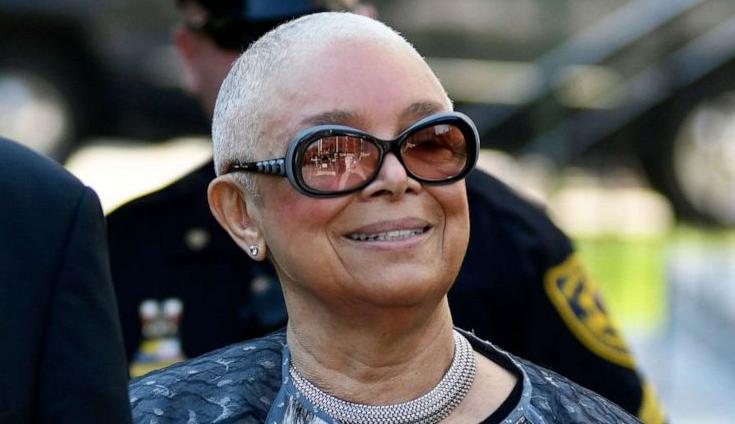[videowaywire video_id=”22918E626573FC31″]

*Nearly 25 years after she released her acclaimed debut “Plantation Lullabies” on Madonna’s Maverick Records label, Meshell Ndegeocello returns with a new collection of covers that pay homage to 80’s/90’s R&B.
As noted by billboard.com, “Ventriloquism” is an 11-track LP (out March 16) that finds the bassist traversing through a ten-year block of time between 1985 and 1995, selecting some of the period’s most infectious radio staples from the likes of Janet Jackson, Sade, TLC, Tina Turner, Ralph Tresvant, Al B. Sure!, Prince, and the Force MDs’ “Tender Love”… scroll up to have a listen to Meshell’s cover.
Listen to “Ventriloquism” via NPR.
Below are excerpts from Billboard’s conversation with Ndegeocello about the album, which transpired shortly after the Grammy Awards aired, and talk about the album’s name led to a discussion about Bruno Mars, where the interview begins.
OTHER NEWS YOU MIGHT HAVE MISSED: On ‘The Real’: Remy Ma Talks Life on Parole & Having a Curfew (WATCH)

What did you think of Bruno that night at the Grammys?
What he’s doing is karaoke, basically. With “Finesse,” in particular, I think he was simply copying Bell Biv DeVoe. I think he was copying Babyface. And definitely, there were some elements of Jimmy Jam & Terry Lewis back when they worked with Human League. I feel like there’s just all these threads running through there but not in a genuine way.
How fine is that balance between karaoke and artistic interpretation?
It’s really a matter of musicality and being able to manipulate the tropes in a way that makes it feel personal. It can’t just be a pastiche, where you’re copying or mimicking an old sound or just doing karaoke. There has to be a form of sincerity.
Ventriloquism proves to be such an intriguing listen. The way you interpret a song like, say, “Private Dancer,” you can really feel the pain in that song where it may have been masked in the Tina Turner version amidst the studio gloss.
It was written by the Dire Straits guitar player Mark Knopfler. You know, “Money for nothing and your chicks for free?” I actually went back and read the lyrics to “Money for Nothing” and thought to myself, “That’s a catchy tune and sounds real joyful but lyrically it’s some dark shit.” I felt the same way about “Private Dancer.” I never understood why people dug the song so much because it was so mean-spirited.
Oh yeah, forgot Knopfler wrote that one…
Yeah, isn’t it weird? I actually want to go back to each of the writers who created these songs and interview them. I actually just found the writer of “Atomic Dog,” and I don’t think anyone knows it was written by a Korean man from Detroit. I got in contact with Jimmy Jam and Terry Lewis to interview them, because they wrote all the hits. But I’d really love to meet and chat with Mark Knopfler as well, yeah.
Another intriguing aspect of Ventriloquism is listening again to songs like “Tender Love,” “Sensitivity” and “Night and Day,” especially in the thick of the #MeToo and Time’s Up movements. Back then, it seemed, the men of R&B were really aiming to write songs from a very sensitive and tender place while still trying to maintain some kind of sex appeal.
Yeah, it was like the troubadour versus the male sex machine. It was a complicated dance. I find myself not being able to listen to a lot of the modern R&B, just because of the vibration it gives off. Those songs by Ralph Tresvant and The Force MDs, they were the black wedding songs (laughs). They all spoke of this amazing tenderness.
What was it that inspired you to focus on this particular era?
I guess it was sparked by just sitting around with my friends and sometimes we enjoy each other’s company by dialing through the periods of music that most affected us. The covers idea was more so the result of a very intense year I experienced with the death of a parent and the dementia of another. And it was nice to just sit with tunes that you love and you know in and out in an emotional way. It was cathartic for me to try to give them another life, these songs.
The Lisa Lisa song, in particular, was quite an experience to go back after hearing your version of “I Wonder If I Take You Home.” It was ahead of its time.
Yeah, definitely. That one really stuck out to me as well. It had me thinking, “Wow that was a really amazing time.” The programming on that first Lisa Lisa & Cult Jam album was so on point, so at the zenith. But you could totally dance to it.
How prominent were some of these songs, especially the ones from the mid-to-late ’80s, during your days as a musician on the D.C. go-go circuit?
All of this was a soundtrack to my youth. And the D.C. go-go bands always would take the hits of the time and filter them through their collective lens, and made those pop tunes more of a fit for that location. They appropriated them for those D.C./Maryland/Virginia vibes at the time, so a lot of this stuff I knew from that period because I had to learn them (laughs). I got to work out a muscle from the past.
It also makes you realize how timeless some of that music is, like Sade.
Those Sade records are for right now as much as they were for back then. It’s funny, I got really riled up about what the Grammy guy Neil Portnow said about women having to step it up. I was really upset and it was really weird, because I had met him before and we had not such a pleasant exchange. But then it hit me that… Nina Simone never won a Grammy. Patti Smith never won a Grammy. Siouxsie Sioux, too. The Grammys are always fun to watch, but you really gotta look elsewhere if you want to hear good music.
The level of unawareness on Portnow’s part when he said that was like Michael Scott, George Costanza and Larry David all rolled up into one.
I don’t know what he was thinking. It was just so insulting. But it was a wake-up call. I was nominated a couple of times in the past, but then I met Portnow and I never got nominated again. I saw behind the curtain. I saw how it works, and it’s cool. They’ve done a lot of great things to help a lot of young people. But there comes a time as a musician or any creative person to reckon whether or not you’re doing it for the accolades. I don’t think I have. But it also becomes clear whose judgments matter to you, and I have let the music industry’s judgments go a long time ago.
We Publish News 24/7. Don’t Miss A Story. Click HERE to SUBSCRIBE to Our Newsletter Now!





